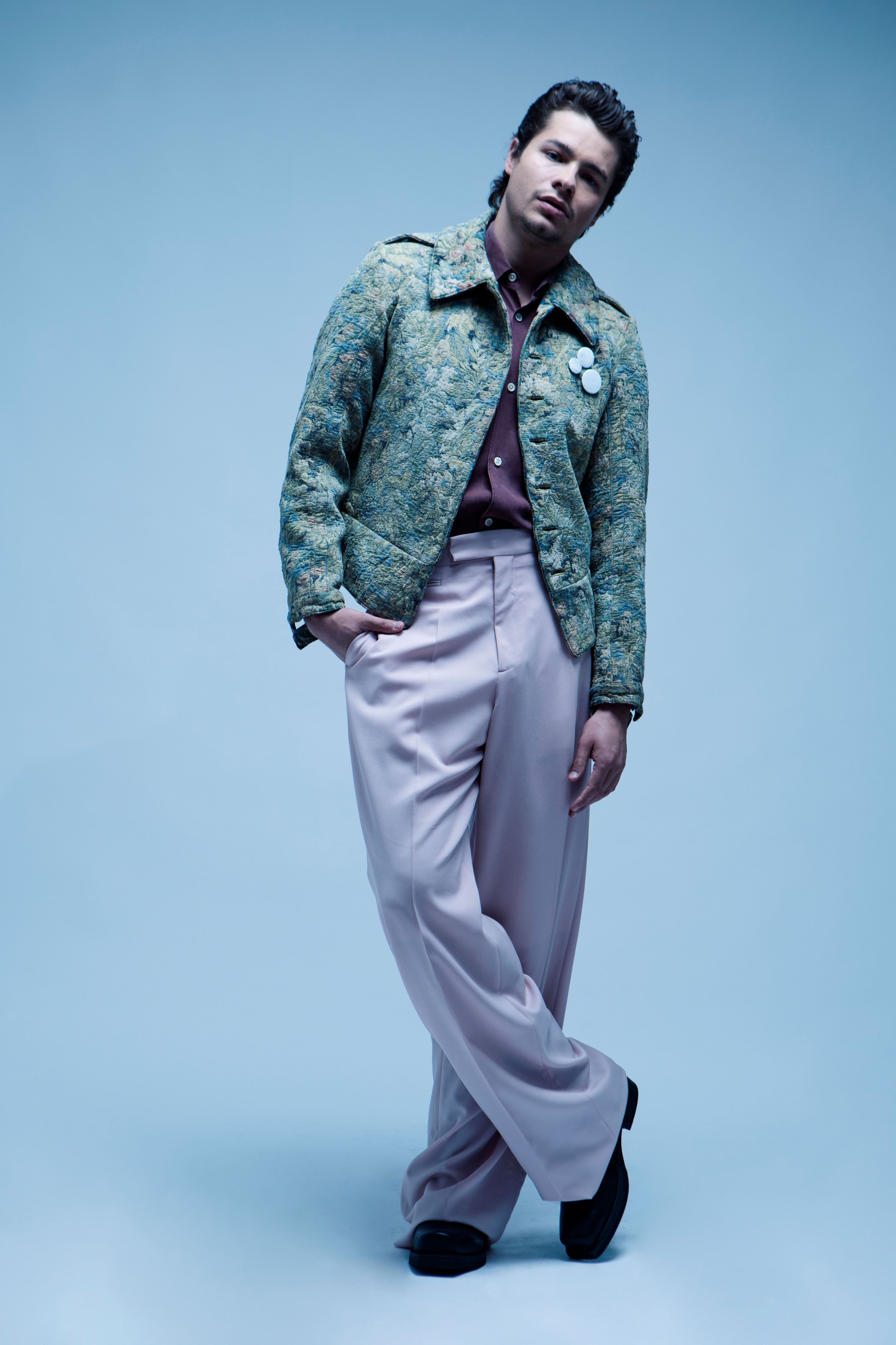
Jacket by Maison Margiela. Shirt and shoes by Our Legacy. Pants by Dior Men.
Toby Wallace Is Ready for Anything
After Toby Wallace was cast as the Sex Pistols guitarist Steve Jones in Pistol, Danny Boyle’s new series about the punk rock band, he did exactly what would be expected from any actor preparing to take on the role of an iconic musician. He listened to the albums, watched the music videos, studied the interviews, immersed himself in the memoir. Then he met Jones himself. “He gave me my first guitar lesson, which I’ll take forever with me. He thought I was shit, not going to lie,“ the 27-year-old Australian actor laughs.
As one of the defining bands of its time, the Sex Pistols not only shaped the course of popular culture, but reflected and influenced a tumultuous society at large, transforming the grievances of an embattled and embittered young generation into a raucous new sound. Faced with wealth disparity, economic stagnation, and social conformity in late-Seventies England, Johnny Rotten, Sid Vicious, Paul Cook, and Jones became the voice and the face of a new movement. Their songs, looks, and opinions lashed out against the monarchy, the government, and societal strictures. “When you talk to anybody who was a teenager when the Pistols blew up, they all talk about it so fondly because it just sounded like England at that time,“ Wallace says. “It was this post-war era, it was very dull, it was very bleak, it was quite regimented. There’d been this depression after the war and people were really stuck in the mud. Being poor in London in the Seventies was pretty bad, pretty grim, it was awful. It was a metropolitan city where if you were poor, you were just living in the dirt.“
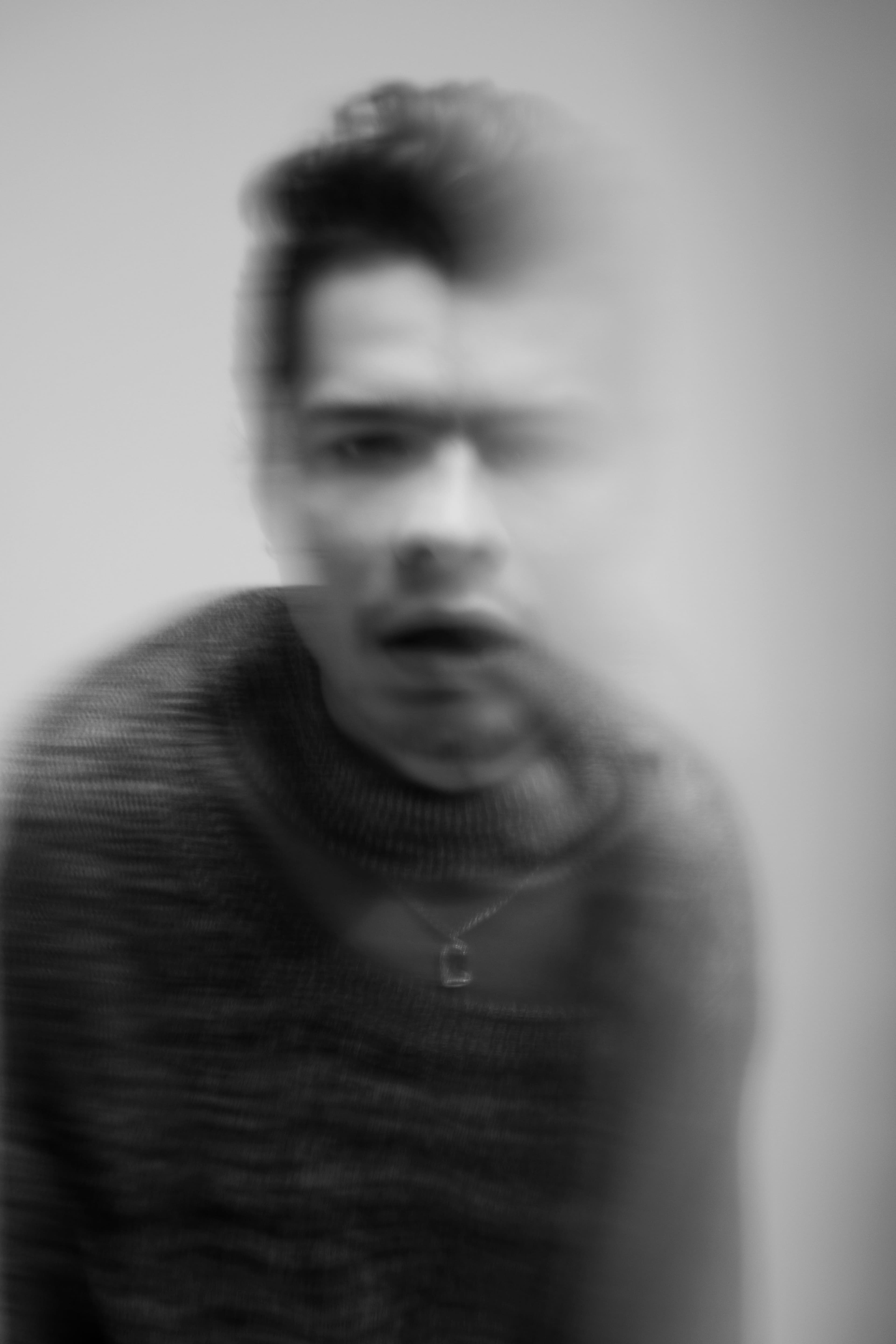
Sweater by Y/Project. Necklace by Bleue Burnham.
A longtime fan of Boyle’s, Wallace says that working on Pistol was an unforgettable opportunity. After spending most of 2020 in locked-down Los Angeles hiking, surfing, “but mostly doing nothing,“ he recalls his visceral reaction to learning he got the part. “I think the entire call where my agents called me and had like five people on the phone, I just walked around my apartment cursing for like ten minutes,“ he laughs. “I just couldn’t believe it.“ The show also gave him the opportunity to put another of his newfound pandemic-era pastimes to use. “I had been playing guitar, or messing around on the guitar, for like a year and a half before the audition came up, and I was getting really into that. I remember saying to my friends at the time, ’Oh man, we should make a band, I really want to be in a band,’“ he recalls. “And then I did get to be in a band! I got to be in the Sex Pistols for like eight months.“
The transition from socially distanced Southern California to a studio bubble in London, performing live shows in front of hundreds of extras, was liberating. As part of the rehearsal process, Wallace and his castmates Anson Boon, Louis Partridge, and Jacob Slater received a crash course from Karl Hyde and Rick Smith of the band Underworld. “We would take a Pistols song and then we’d do the reggae version of it, and then we’d take another song and then we’d do the rock version of it, then we’d do the rap version of it,“ Wallace recalls. “The aim was trying to learn how to be a musician, in the way of listening to each other. Someone was always changing it, so we were always having to listen to each other so that we became a tight-knit band.“
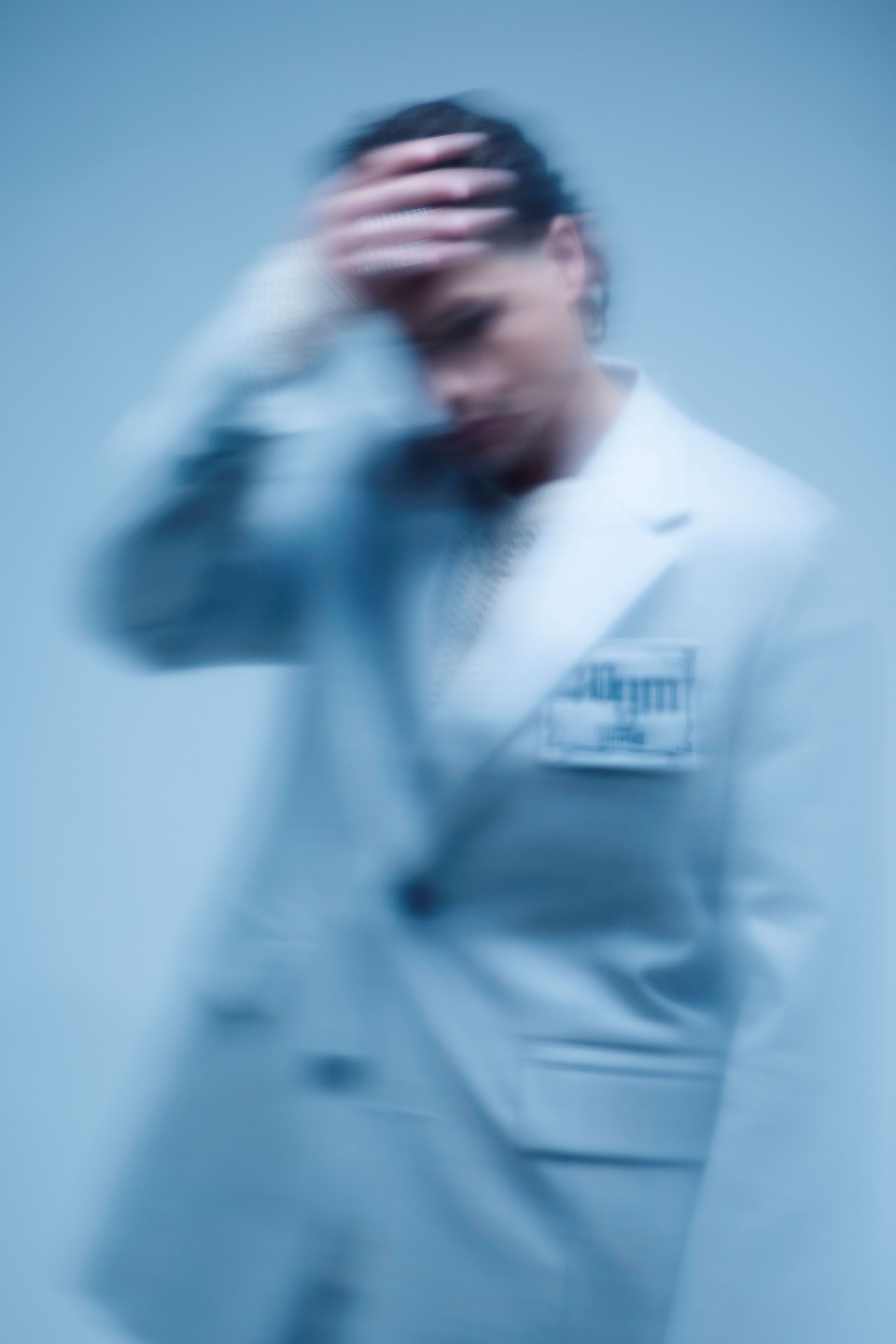
All clothing by Wooyoungmi
When filming began, Boyle, who first made his name with the iconic punk-inflected 1996 film Trainspotting, made it clear to everyone involved how epochal the Sex Pistols were. In talks with the cast and crew and in speeches to energize extras before live performances, the director stressed that the band championed England’s downtrodden working class, a demographic that had not often seen itself and its needs reflected in popular culture. “It sounded a lot like if you talked up, especially as a youngster, you were shunned or you were shut down immediately. There was no real space to speak out or speak your mind, I think that whole generation had grown up being patronized and condescended to,“ Wallace explains. “It says this in Steve’s autobiography. His trauma was the motor that started his ambition to create a band because he had so much anger. He was so furious. So he created this band that represented the unrepresented and then Johnny Rotten came on and then Sid Vicious, and then [manager] Malcolm McLaren completely manipulated the entire situation so that they really did represent chaos. It all came together and they were the perfect band for the perfect moment. They really represented every single young person at that time’s frustrations.“
Pistol also marks a homecoming of sorts for Wallace, who was born in London and moved to Melbourne with his family at the age of eight. His acting career began soon after, when a management company noticed him during his high school drama class and began to send him on auditions, landing him his first film role at fourteen. At the time, he wanted to direct and recalls being “that kid running around with a video camera trying to make all of his friends act in short films,“ but he grew to love acting after numerous parts in Australian films and shows, including the long-running soap opera Neighbours. In 2019, his riveting performance as Moses in the Australian indie Babyteeth helped launched him onto the international stage.
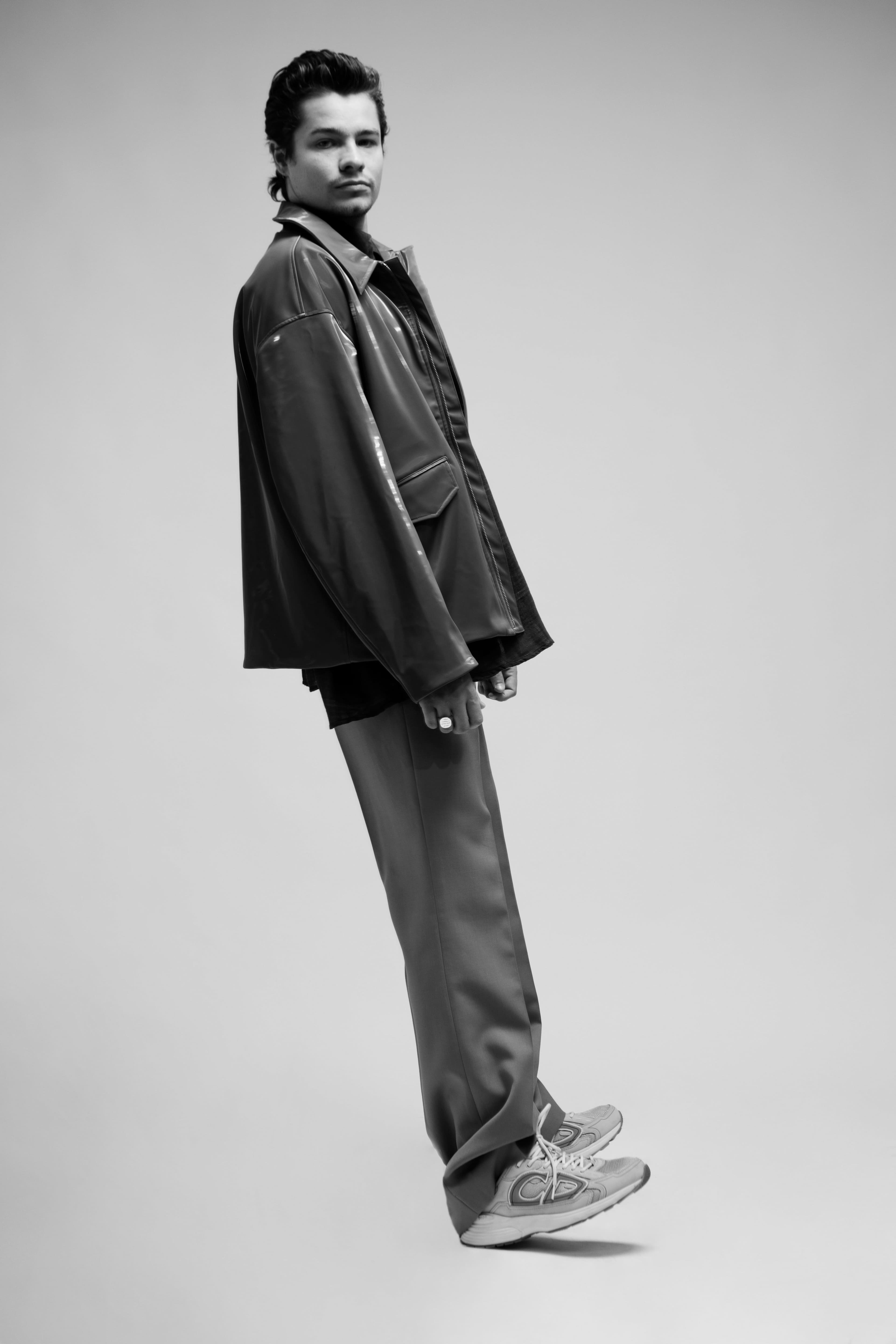
Jacket by Holzweiler. Shirt by Our Legacy. Pants by Wooyoungmi. Shoes by Dior Men. Rings by Bleue Burnham.
Directed by Shannon Murphy, Babyteeth traces the highs and lows of the romance that develops between Milla, played by Eliza Scanlen, a high school student with terminal cancer, and Wallace’s Moses, a slightly older small-time drug dealer whom she meets at a train station. Concerned by the age difference and Moses’s behavior after they catch him stealing prescription drugs, Milla’s parents at first forbid the relationship, eventually relenting as they realize that Moses is a rare source of joy in the life of their dying daughter. A complex combination of raw humor and poignant loss, the film became a sleeper hit after its premiere at the 2019 Venice Film Festival, gaining worldwide attention after it was released on Netflix in the summer of 2020. “Australian films, every now and again, one will slide through the wall and people get really hyped about it because it feels so original,“ Wallace explains. “Australian culture’s pretty bizarre, so if we are able to make a good film, it does feel really original. If it gets to the rest of the world, people are like, ’Oh, wow.’“
Praising Rita Kalnejais’s script, Wallace says he felt an instant connection with Moses, who has undeniable charisma coupled with an unerring sense of loyalty and duty to Milla. “Every now and again, it’s really rare, but you’ll get a character where there’s aspects of them that ring so clear with you and hold so much truth and alignment with you and your own life that you don’t really even have to do that much work,“ he says, pointing to Moses’s struggles with himself, his purpose, and where he belonged in the world. Inhabiting Moses offered Wallace the opportunity to reflect on himself, helping cement in him the kind of actor and person he wanted to be. “I think Moses had this philosophy about the world being beautiful and why it wasn’t beautiful and constantly trying to run away from the pain in his life in whatever way he could, with nihilism as well, and towards things that made him feel better ephemerally,“ he adds. “Then learning the lesson over the course of the film that he should take responsibility for the people that he loves in his life and for his own life, that all just rang really true for me. Also just his sense of humor, who he was as a person, was really fun for me. I remember reading it and I knew immediately what to do with it.“
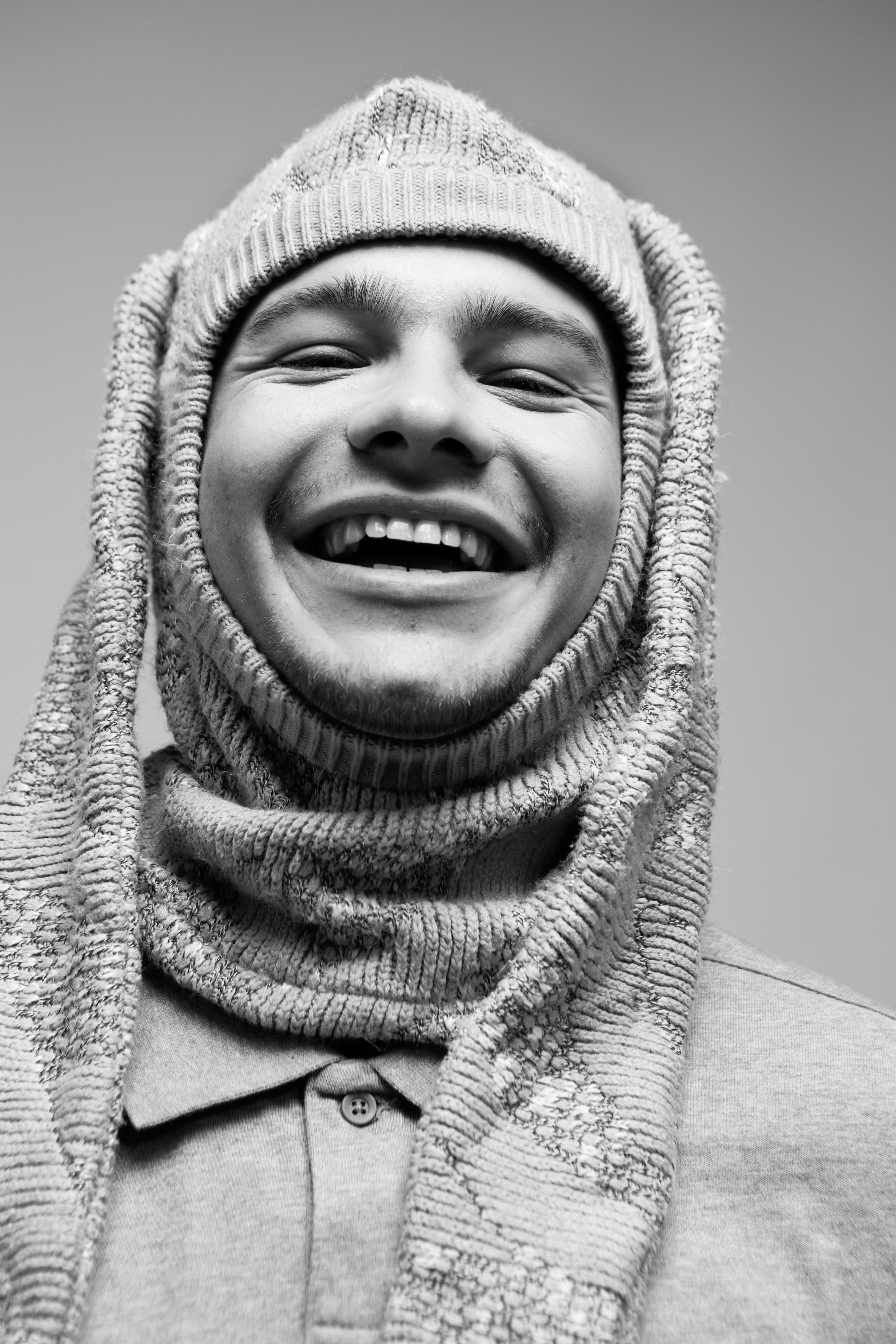
Polo shirt by Fear of God Essentials. Balaclava by Ms. Maskie.
Wallace is now quick to offer his gratitude for a film that “completely changed my life,“ but admits that the first time he watched the final cut, he saw it in a very different light. “I can’t watch my own stuff ever. It’s a complete nightmare,“ he says. “I remember them sending me Babyteeth and I had a meltdown and I thought that I had completely ruined the film. Genuinely, I remember crying after watching it because I was so embarrassed. I was like, ’Oh my god, everyone’s so good, the film’s so good, but I’ve ruined it. What have I done to this film?’ The director and the producer called me to come out to Venice and I was trying to find all these excuses not to go because I was like, ’What am I going to do? I literally cannot show my face there, this is so embarrassing.’ I felt really afraid. Then I went to Venice and everybody kind of loved it. Then that ceremony happened at the end and I was like, ’Oh! This is a pleasant surprise.’“ At the festival’s closing ceremony, Wallace was awarded the Marcello Mastroianni Award for an emerging performer, following in the footsteps of Jennifer Lawrence, Mila Kunis, Gael García Bernal, and Diego Luna.
Having just finished a stint near Boston filming the crime drama Finestkind alongside Tommy Lee Jones and Ben Foster, Wallace seems ready to tackle anything that comes his way with similar enthusiasm and passion. Having established himself as a young actor of impressive commitment and range, he says he has been writing lately with the hopes of returning to his first love of directing soon. Until then, he’ll just have to get more comfortable with watching himself onscreen.
Pistol is now streaming on FX on Hulu. Read this story and many more in print by ordering CERO04 here.
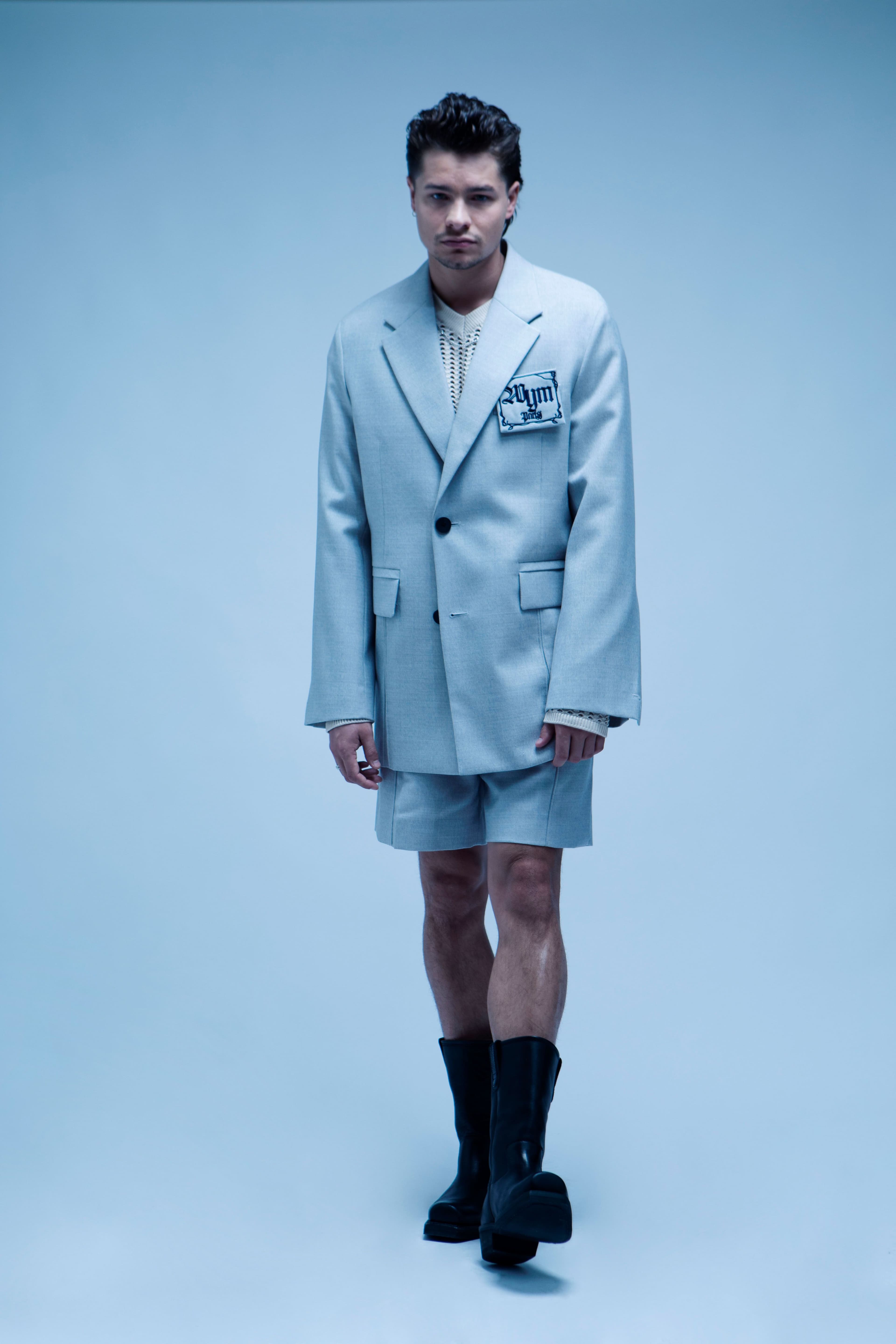
All clothing by Wooyoungmi. Boots by Our Legacy. Rings by Bleue Burnham.
As a nonprofit arts and culture publication dedicated to educating, inspiring, and uplifting creatives, Cero Magazine depends on your donations to create stories like these. Please support our work here.






